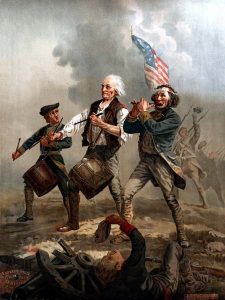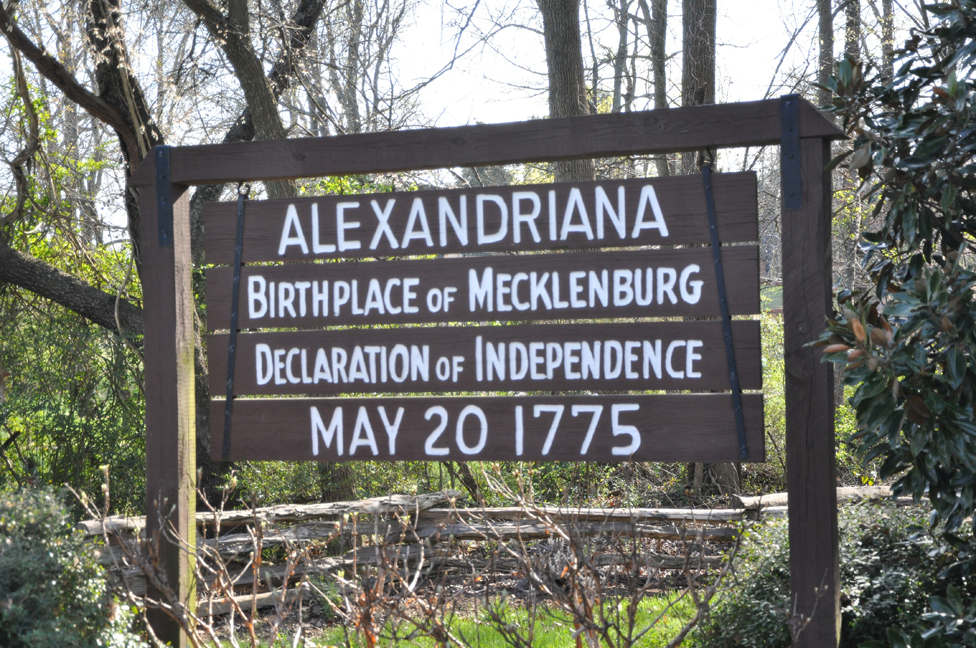 The first version of “Yankee Doodle” seems to have been written by a British army physician, Dr. Richard Schuckberg, during the French and Indian War. It was a satiric look at New England’s Yankees.
The first version of “Yankee Doodle” seems to have been written by a British army physician, Dr. Richard Schuckberg, during the French and Indian War. It was a satiric look at New England’s Yankees.
Brother Ephraim sold his cow
And bought him a commission
And then he went to Canada
To fight for the nation;
But when Ephraim,
he came home
He proved an arrant coward,
He wouldn’t fight the
Frenchmen there
For fear of being devoured.
Sheep’s head and vinegar
Buttermilk and tansy
Boston Is a Yankee town,
Sing “Hey, doodle dandy!”
The song continued for many more verses, several of them scatological. With different verses, it soon became popular throughout the colonies. A broadside of the 1770s has a version which became more or less standard. It is a country bumpkin’s reaction to his first visit to an army camp.
Father and I went
down to camp
Along with Captain Goodwin
And there we saw the men and boys
As thick as hasty puddin’
And there they had a little keg
The heads were made of leather
They rap’t upon’t with little clubs
To call the folks together.
There I saw a swamping gun
As big’s a log of maple,
Put upon two little wheels
A load for father’s cattle.
I saw a man a’talking there
You might heard to the barn, sir,
Halooing and scolding too—
The deal of one would answer.
There he kept a riding round
Upon a spanking stallion.
And all the people standing round,
A thousand or a million.
In 1775 a minuteman named Edward Bangs published another version that might have been sung by a boy visiting the army besieging the British in Boston, after George Washington took command of it.
And there was Captain Washington
And gentle folks about him;
They say he’s grown so tarnal proud
He will not ride without them.
By this time it was obvious that anyone could write verses for “Yankee Doodle.” On the march to Lexington and Concord, according to one story, the British troops sang this stanza.
Yankee Doodle’s come to town
For to buy a firelock,
We will tar and feather him
And so will we John Hancock.
The verse that the American soldiers liked best summed up Yankee Doodle’s popularity.
Yankee Doodle is the tune
That we all delight in;
It suits for feasts, it suits for fun,
And just as well for fightin’.
At Yorktown, when the British marched out to surrender, they marched with their heads turned toward the French troops. They were trying to pretend the Americans did not exist.The Marquis de Lafayette, the commander of the Light Infantry brigade, was outraged. He ordered his band to play Yankee Doodle. With a blast of drums and a swirl of fifes, the musicians hurled themselves into their favorite song. Every British head was jerked around, and they stared into the faces of their former subjects.









11 Comments
Crailo State Historic Site in Rensselaer, NY is the supposed site where Shuckberg wrote “Yankee Doodle”. The circumstantial evidence is there; the farm was a muster spot for the militia, Shuckberg was in the area during the time when Abercrombie was assembling his force for the attack on Fort Ticonderoga. Unfortunately the only account of him writing the poem at Crailo comes second hand, several decades after the event by the granddaughter of one of the residents. The well that Shuckberg supposedly sat on while composing has been rebuilt and stands next to the house.
Mr. Fleming – loved the background story you gave to this tune we’ve all grown up with! The Yorktown payback was especially good. Your “Liberty!” book and PBS series is a legend in my household. Thank you!
Thanks for this. I’m actually doing some work on the Yankee Doodle and was wondering where you found the material that suggests that Lafayette ordered the American troops at Yorktown to strike the Yankee Doodle tune. I’m familiar with the story and found accounts portraying the airing of the tune by the Americans, but could not pin down any source that proves the full story.
This is the first article I’ve found that had Captain Goodwin instead of Captain Gooding.. I have a very old song book with Goodwin, and upon reading an educational book I found Gooding.. I was of course inspired to research further.. it often surprises me how many do not research information and just take things at face value.
Thank you for the explanation of varied lyrics.. I wondered after reading several articles how each could have such different words, not to mention no other had Goodwin.
I found this webpage as a result of being a huge Turn: Washington Spies series on AMC. They showed the Yorktown surrender of the British. The British band was playing their anthem and Lafayette ordered his band to play Yankee Doodle. I thought it was interesting and funny at the time I watched but then found more information on the Facebook page for Turn: Washington Spies and then was lucky to find this entry. Thank you. The history makes me proud.
Could you please cite the source for the Yorktown story-published-not a website please.? In the interests of historical accuracy. I have my doubts about it.(sorry)
I have one primary source reference in support of part of the Yorktown story. The “Continental Journal” for November 8, 1781, included an article dated Fishkill, November 1, that says, “We learn that General Lincoln received the captured Lord Cornwallis; and that the army played Yankee doodle, when the British army marched to lay down their arms.” It doesn’t say that LaFayette gave the order.
As an aside, a version of the song appeared in the “Pennsylvania Packet” five weeks later (and subsequently in other papers). It mocked Cornwallis and his surrendered army in thirteen stanzas.
We regret that the author of this article, a widely respected historian and an avid contributor this publication, passed away early this year. His work will be missed.
It is a myth that “Yankee Doodle” was originally a patriotic song. It was composed in England as an anti-American tune. The phrase “stuck a feather in his cap and called it macaroni” referred to a foppish English group called the Macaroni Club, whose members wore ludicrous “continental” fashions they mistakenly believed to be elegant. The British laughed at “Yankee Doodle dandies,” bumkins who didn’t know how silly they really were.
As a bit of a student on Yankee Doodle, I’d like to see some sources posted. My learning doesn’t quite agree with your story sir.
We regret that author Thomas Fleming passed away in 2017, making it impossible to provide any additional details to this article. If you’re able to present an alternative story, based on primary sources, we would be happy to consider it for publication.